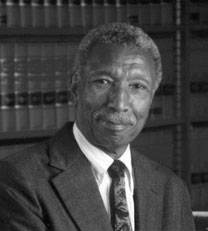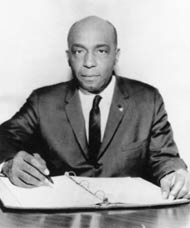Brown v. Board of Education of Topeka, 347 U.S. 483 (1954), was a landmark decision of the U.S. Supreme Court in which the Court ruled that U.S. state laws establishing racial segregation in public schools are unconstitutional, even if the segregated schools are otherwise equal in quality. Handed down on May 17, 1954, the Court's unanimous (9–0) decision stated that "separate educational facilities are inherently unequal", and therefore violate the Equal Protection Clause of the Fourteenth Amendment of the U.S. Constitution. However, the decision's 14 pages did not spell out any sort of method for ending racial segregation in schools, and the Court's second decision in Brown II only ordered states to desegregate "with all deliberate speed".
A lawsuit is a proceeding by a party or parties against another in the civil court of law. The archaic term "suit in law" is found in only a small number of laws still in effect today. The term "lawsuit" is used in reference to a civil action brought by a plaintiff demands a legal or equitable remedy from a court. The defendant is required to respond to the plaintiff's complaint. If the plaintiff is successful, judgment is in the plaintiff's favor, and a variety of court orders may be issued to enforce a right, award damages, or impose a temporary or permanent injunction to prevent an act or compel an act. A declaratory judgment may be issued to prevent future legal disputes.

The NAACP Legal Defense and Educational Fund, Inc. is a leading United States civil rights organization and law firm based in New York City.

Robert Lee Carter was an American lawyer, civil rights activist and a United States District Judge of the United States District Court for the Southern District of New York.

Oliver White Hill, Sr. was an American civil rights attorney from Richmond, Virginia. His work against racial discrimination helped end the doctrine of "separate but equal." He also helped win landmark legal decisions involving equality in pay for black teachers, access to school buses, voting rights, jury selection, and employment protection. He retired in 1998 after practicing law for almost 60 years. Among his numerous awards was the Presidential Medal of Freedom, which U.S. President Bill Clinton awarded him in 1999.
The Lawyers' Committee for Civil Rights Under Law, or simply the Lawyers' Committee, is a civil rights organization founded in 1963 at the request of President John F. Kennedy. At the time of President Kennedy's request, Alabama Governor George Wallace vowed to resist court-ordered desegregation of the University of Alabama. Voting rights activist Medgar Evers was assassinated inside his home in Mississippi on June 11th. These events galvanized private lawyers to call for officials to commit to the rule of law. These events also prompted President Kennedy to call for private lawyers to do more to defend the civil rights of Black citizens, with Ever's assassination amounting to the last straw. The organization's long-standing mission is to secure equal justice for all through the rule of law by enlisting the leadership of the private bar. While the Lawyers' Committee works to stop all civil rights violations, the majority of its work targets the inequities that primarily confront African Americans, and other people of color.
In the United States, a legal defense fund is an account set up to pay for legal expenses, which can include attorneys' fees, court filings, litigation costs, legal advice, or other legal fees. The fund can be public or private and is set up for individuals, organizations, or for a particular purpose. These funds are often used by government public officials, civil rights organizations, and public interest organizations.
Litigation public relations, also known as litigation communications, is the management of the communication process during the course of any legal dispute or adjudicatory processing so as to affect the outcome or its impact on the client's overall reputation. The aims of litigation PR differ from general PR in that they are tied to supporting a legal dispute rather than general profile raising. Accordingly, there is a greater focus on the legal implications of any communications given the strategic aims and sensitive rules around disclosure during court proceedings. According to The New York Times, sophisticated litigation public relations efforts have included "round-the-clock crisis P.R. response, efforts to shape internet search results, and a website with international reports and legal filings" intended to support one side of the case.
Hedgepeth and Williams v. Board of Education, Trenton, NJ, also known as the Hedgepeth–Williams case, was a 1944 New Jersey Supreme Court decision in a legal action brought by two mothers, Gladys Hedgepeth and Berline Williams, who sued the Trenton, New Jersey, Board of Education over racial discrimination against their children, Leon Williams and Janet Hedgepeth. It was a precursor to the Brown v. Board of Education case that prohibited racial segregation of school systems throughout the United States. Throughout the US this change made a huge difference in the integration of school.
Legal aid in the United States is the provision of assistance to people who are unable to afford legal representation and access to the court system in the United States. In the US, legal aid provisions are different for criminal law and civil law. Criminal legal aid with legal representation is guaranteed to defendants under criminal prosecution who cannot afford to hire an attorney. Civil legal aid is not guaranteed under federal law, but is provided by a variety of public interest law firms and community legal clinics for free or at reduced cost. Other forms of civil legal aid are available through federally-funded legal services, pro bono lawyers, and private volunteers.

Samuel Wilbert Tucker was an American lawyer and a cooperating attorney with the National Association for the Advancement of Colored People (NAACP). His civil rights career began as he organized a 1939 sit-in at the then-segregated Alexandria, Virginia public library. A partner in the Richmond, Virginia, firm of Hill, Tucker and Marsh, Tucker argued and won several civil rights cases before the Supreme Court of the United States, including Green v. County School Board of New Kent County which, according to The Encyclopedia of Civil Rights In America, "did more to advance school integration than any other Supreme Court decision since Brown."
Cesar Augusto Perales is an American attorney, civil servant and was the previous Secretary of State of New York in the Cabinet of Governor Andrew Cuomo. Perales was appointed by Cuomo on March 31, 2011 and unanimously confirmed by the New York State Senate on June 7.

The National Association for the Advancement of Colored People (NAACP) is a civil rights organization in the United States, formed in 1909 as an interracial endeavor to advance justice for African Americans by a group including W. E. B. Du Bois, Mary White Ovington, Moorfield Storey and Ida B. Wells.
William Robert Ming Jr. was an American lawyer, attorney with the National Association for the Advancement of Colored People (NAACP) and law professor at University of Chicago Law School and Howard University School of Law. He is best remembered for being a member of the Brown v. Board of Education litigation team and for working on a number of the important cases leading to Brown, the decision in which the United States Supreme Court ruled de jure racial segregation a violation of the Equal Protection Clause of the Fourteenth Amendment of the United States Constitution.
NAACP v. Button, 371 U.S. 415 (1963), is a 6-to-3 ruling by the Supreme Court of the United States which held that the reservation of jurisdiction by a federal district court did not bar the U.S. Supreme Court from reviewing a state court's ruling, and also overturned certain laws enacted by the state of Virginia in 1956 as part of the Stanley Plan and massive resistance, as violating the First and Fourteenth Amendments to the United States Constitution. The statutes here stricken down by the Supreme Court had expanded the definitions of the traditional common law crimes of champerty and maintenance, as well as barratry, and had been targeted at the NAACP and its civil rights litigation.
A cause lawyer, also known as a public interest lawyer or social lawyer, is a lawyer dedicated to the usage of law for the promotion of social change to address a cause. Cause lawyering is commonly described as a practice of "lawyering for the good" or using law to empower members of the weaker layers of society. It may or may not be performed pro bono. Cause lawyering is frequently practiced by individual lawyers or lawyers employed by associations that aim to supply a public service to complement state-provided legal aid.
Public interest law refers to legal practices undertaken to help poor or marginalized people, or to effect change in social policies in the public interest, on 'not for profit' terms.

The Disability Rights Education and Defense Fund (DREDF), located in Berkeley, California, and Washington, DC, USA is a national cross-disability civil rights law and policy center directed by individuals with disabilities and parents who have children with disabilities. Founded in 1979, DREDF advances the civil and human rights of people with disabilities through legal advocacy, training, education, and public policy and legislative development. The Berkeley office is located in the Ed Roberts Campus.

The Public Interest Law Center, founded in 1969, is a nonprofit law firm based in Philadelphia. The Public Interest Law Center works primarily in the greater Philadelphia region occasionally taking on issues on a national scale.

Richard Barry Sobol was an American lawyer who specialized in civil rights law. Sobol primarily worked on desegregation cases in Louisiana.








